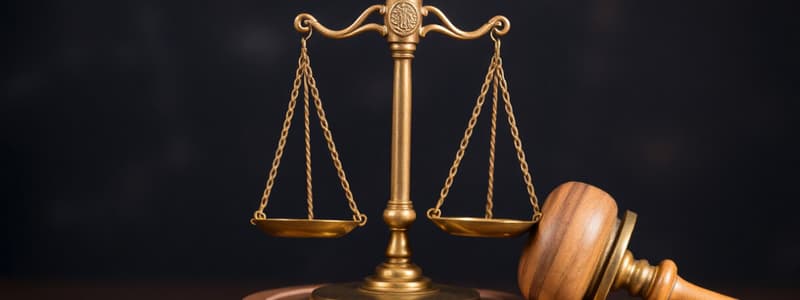Podcast
Questions and Answers
Which type of law is primarily concerned with actions that are harmful to society?
Which type of law is primarily concerned with actions that are harmful to society?
- Criminal Law (correct)
- Constitutional Law
- Civil Law
- Administrative Law
What is the primary function of Administrative Law?
What is the primary function of Administrative Law?
- To interpret the Constitution
- To govern disputes between individuals
- To regulate governmental agency activities (correct)
- To adjudicate criminal cases
Which principle ensures protection of individual rights within the legal framework?
Which principle ensures protection of individual rights within the legal framework?
- Negative liberty
- Due Process (correct)
- Civil Rights
- Equal Protection
What does the term 'jurisdiction' refer to in legal terms?
What does the term 'jurisdiction' refer to in legal terms?
In which legal system are laws primarily derived from written codes and statutes?
In which legal system are laws primarily derived from written codes and statutes?
Which process involves a formal examination of evidence in a court setting?
Which process involves a formal examination of evidence in a court setting?
The concept of 'precedent' is essential in which legal system?
The concept of 'precedent' is essential in which legal system?
What is the primary role of a paralegal in the legal profession?
What is the primary role of a paralegal in the legal profession?
Flashcards are hidden until you start studying
Study Notes
Definition of Law
- A system of rules created and enforced through social or governmental institutions.
- Governs behavior and maintains order in society.
Types of Law
- Criminal Law
- Deals with crimes and punishments.
- Focuses on actions that are harmful to society.
- Civil Law
- Governs disputes between individuals or organizations.
- Involves compensation rather than punishment.
- Administrative Law
- Regulates the activities of governmental agencies.
- Addresses regulations and rules set by government entities.
- Constitutional Law
- Involves the interpretation and implementation of the Constitution.
- Ensures the protection of individual rights.
Key Concepts
- Legal Principle: Fundamental propositions that guide court decisions.
- Jurisdiction: The authority given to a legal body to administer justice within a certain area or over particular subjects.
- Precedent: Previous court decisions that influence future cases; part of the common law system.
- Litigation: The process of taking legal action; involves a lawsuit.
Sources of Law
- Legislation: Laws enacted by legislative bodies.
- Common Law: Law derived from judicial decisions instead of statutes.
- Constitutions: Foundational legal documents of a state or country.
- International Law: Governs the conduct of nations and international organizations.
Legal Systems
- Common Law: Based on judicial decisions and precedents.
- Civil Law: Based on written codes and statutes.
- Religious Law: Based on religious texts and practices.
Legal Processes
- Trial: A formal examination of evidence in court.
- Appeal: A request to a higher court to review the decision of a lower court.
- Arbitration: A method of resolving disputes outside of court, where an arbitrator makes a binding decision.
Careers in Law
- Lawyer/Attorney: Represents clients in legal matters.
- Judge: Oversees court proceedings and makes legal rulings.
- Paralegal: Supports lawyers by conducting research and managing cases.
- Law Clerk: Assists judges with legal paperwork and research.
Legal Rights
- Due Process: The right to fair legal proceedings.
- Equal Protection: The right to be treated equally under the law.
- Right to Counsel: The right to have legal representation in criminal cases.
Recent Trends in Law
- Cyber Law: Addresses legal issues in the digital environment.
- Human Rights Law: Focuses on the protection of fundamental rights and freedoms.
- Environmental Law: Concerns regulations aimed at protecting the environment.
Conclusion
- Law is a complex system essential for maintaining order and justice in society. It encompasses various branches, principles, and processes, each playing a crucial role in the functioning of legal and societal frameworks.
Definition of Law
- Governs behavior and ensures order within society.
- System of rules created and enforced through social or governmental institutions.
Types of Law
- Criminal Law: Deals with crimes and their punishments, focusing on actions harmful to society as a whole.
- Civil Law: Focuses on disputes between individuals or organizations, aiming for compensation rather than punishment.
- Administrative Law: Regulates the activities of governmental agencies, covering rules and regulations set by government entities.
- Constitutional Law: Involves the interpretation and execution of the Constitution, safeguarding individual rights.
Key Concepts
- Legal Principle: Fundamental propositions guiding court decisions.
- Jurisdiction: Authority given to a legal body to administer justice within a specific area or over certain topics.
- Precedent: Previous court decisions influencing future cases, crucial in the common law system.
- Litigation: Process of taking legal action, involving lawsuits.
Sources of Law
- Legislation: Laws enacted by legislative bodies.
- Common Law: Law derived from judicial decisions rather than statutes.
- Constitutions: Foundational legal documents governing a state or country.
- International Law: Regulates the conduct of nations and international organizations.
Legal Systems
- Common Law: Based on judicial decisions and precedents.
- Civil Law: Based on written codes and statutes.
- Religious Law: Based on religious texts and practices.
Legal Processes
- Trial: Formal examination of evidence in court.
- Appeal: Requesting a higher court to review a lower court's decision.
- Arbitration: Resolving disputes outside of court through an arbitrator's binding decision.
Careers in Law
- Lawyer/Attorney: Represents clients in legal matters.
- Judge: Oversees court proceedings and makes legal rulings.
- Paralegal: Supports lawyers by conducting research and managing cases.
- Law Clerk: Assists judges with legal paperwork and research.
Legal Rights
- Due Process: Right to fair legal proceedings.
- Equal Protection: Right to be treated equally under the law.
- Right to Counsel: Right to have legal representation in criminal cases.
Recent Trends in Law
- Cyber Law: Addresses legal issues in the digital environment.
- Human Rights Law: Focuses on protecting fundamental rights and freedoms.
- Environmental Law: Concerns regulations aiming to safeguard the environment.
Conclusion
- Law is a complex system vital for maintaining order and justice in society.
- It encompasses various branches, principles, and processes, each crucial to the functioning of legal and social frameworks.
Studying That Suits You
Use AI to generate personalized quizzes and flashcards to suit your learning preferences.




